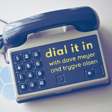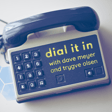
S3 Ep23: Mastering Improvisation and Humor with Stevie Ray
In this episode of the Dial It In podcast, hosts Trygve and Dave reminisce about their first meeting and introduce humor expert Stevie Ray. They highlight Stevie's influence on their lives and his unique approach to teaching improv, emphasizing its value beyond the stage. Stevie shares his journey from aspiring speech therapist to founding Stevie Ray's Improv Company, offering insights into the therapeutic and pedagogical aspects of humor. They discuss the eight rules of improv, the balance between humor and professionalism, and how to effectively use humor in today's polarized world. The episode also touches on the role of humor in societal cohesion and the complexities of appreciating controversial comedians like Bill Cosby. The conversation concludes with an emphasis on the importance of trust and listening in successful improvisation and sales techniques.
Connect with Stevie:
steviesrays.org
Sponsor:
DataQuick.co
…
Dial It In Podcast is where we gather our favorite people together to share their advice on how to drive revenue, through storytelling and without the boring sales jargon. Our primary focus is marketing and sales for manufacturing and B2B service businesses, but we’ll cover topics across the entire spectrum of business. This isn’t a deep, naval-gazing show… we like to have lively chats that are fun, and full of useful insights. Brought to you by BizzyWeb.
Links:
Website: dialitinpodcast.com
BizzyWeb site: bizzyweb.com
Connect with Dave Meyer
Connect with Trygve Olsen

